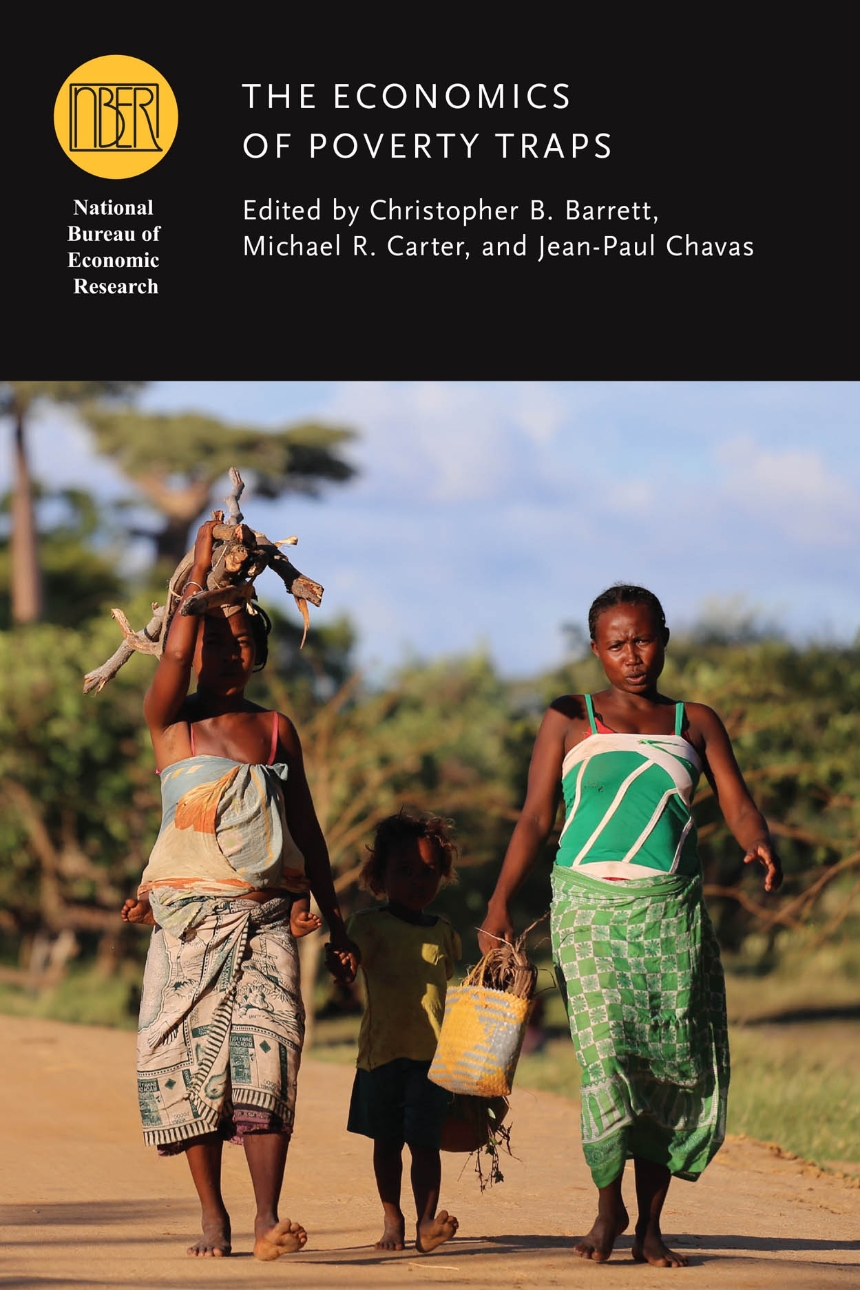The Economics of Poverty Traps
What circumstances or behaviors turn poverty into a cycle that perpetuates across generations? The answer to this question carries especially important implications for the design and evaluation of policies and projects intended to reduce poverty. Yet a major challenge analysts and policymakers face in understanding poverty traps is the sheer number of mechanisms—not just financial, but also environmental, physical, and psychological—that may contribute to the persistence of poverty all over the world.
The research in this volume explores the hypothesis that poverty is self-reinforcing because the equilibrium behaviors of the poor perpetuate low standards of living. Contributions explore the dynamic, complex processes by which households accumulate assets and increase their productivity and earnings potential, as well as the conditions under which some individuals, groups, and economies struggle to escape poverty. Investigating the full range of phenomena that combine to generate poverty traps—gleaned from behavioral, health, and resource economics as well as the sociology, psychology, and environmental literatures—chapters in this volume also present new evidence that highlights both the insights and the limits of a poverty trap lens.
The framework introduced in this volume provides a robust platform for studying well-being dynamics in developing economies.
The research in this volume explores the hypothesis that poverty is self-reinforcing because the equilibrium behaviors of the poor perpetuate low standards of living. Contributions explore the dynamic, complex processes by which households accumulate assets and increase their productivity and earnings potential, as well as the conditions under which some individuals, groups, and economies struggle to escape poverty. Investigating the full range of phenomena that combine to generate poverty traps—gleaned from behavioral, health, and resource economics as well as the sociology, psychology, and environmental literatures—chapters in this volume also present new evidence that highlights both the insights and the limits of a poverty trap lens.
The framework introduced in this volume provides a robust platform for studying well-being dynamics in developing economies.
464 pages | 66 line drawings, 33 tables | 6 x 9 | © 2018
National Bureau of Economic Research Conference Report
Economics and Business: Economics--Development, Growth, Planning
Reviews
Table of Contents
Acknowledgments
Introduction
Christopher B. Barrett, Michael R. Carter, and Jean-Paul Chavas
I. Nutrition, Health, and Human Capital Formation
1. Human Capital and Shocks: Evidence on Education, Health, and Nutrition
Elizabeth Frankenberg and Duncan Thomas
2. Poverty and Cognitive Function
Emma Boswell Dean, Frank Schilbach, and Heather Schofield
Comment on chapters 1 and 2: John Hoddinott
II. Psychology of Poverty, Hope, and Aspirations
3. Depression through the Lens of Economics: A Research Agenda
Jonathan de Quidt and Johannes Haushofer
4. Hope as Aspirations, Agency, and Pathways: Poverty Dynamics and Microfinance in Oaxaca, Mexico
Travis J. Lybbert and Bruce Wydick
Comment on chapters 3 and 4: Rachid Laajaj
III. Imperfect and Incomplete Financial Markets
5. Taking Stock of the Evidence on Microfinancial Interventions
Francisco J. Buera, Joseph P. Kaboski, and Yongseok Shin
6. Poverty Traps and the Social Protection Paradox
Munenobu Ikegami, Michael R. Carter, Christopher B. Barrett, and Sarah Janzen
Comment on chapters 5 and 6: Stephen C. Smith
IV. Dynamics and Resilience in Natural Resources and Agriculture
7. Heterogeneous Wealth Dynamics: On the Roles of Risk and Ability
Paulo Santos and Christopher B. Barrett
8. Agroecosystem Productivity and the Dynamic Response to Shocks
Jean-Paul Chavas
Comment on chapters 7 and 8: Edward B. Barbier
V. Policy in the Presence of Poverty-Trap Mechanisms
9. Sustaining Impacts When Transfers End: Women Leaders, Aspirations, and Investments in Children
Karen Macours and Renos Vakis
10. Can Cash Transfers Help Households Escape an Intergenerational Poverty Trap?
M. Caridad Araujo, Mariano Bosch, and Norbert Schady
Comment on chapters 9 and 10: Maitreesh Ghatak
Contributors
Author Index
Subject Index
Introduction
Christopher B. Barrett, Michael R. Carter, and Jean-Paul Chavas
I. Nutrition, Health, and Human Capital Formation
1. Human Capital and Shocks: Evidence on Education, Health, and Nutrition
Elizabeth Frankenberg and Duncan Thomas
2. Poverty and Cognitive Function
Emma Boswell Dean, Frank Schilbach, and Heather Schofield
Comment on chapters 1 and 2: John Hoddinott
II. Psychology of Poverty, Hope, and Aspirations
3. Depression through the Lens of Economics: A Research Agenda
Jonathan de Quidt and Johannes Haushofer
4. Hope as Aspirations, Agency, and Pathways: Poverty Dynamics and Microfinance in Oaxaca, Mexico
Travis J. Lybbert and Bruce Wydick
Comment on chapters 3 and 4: Rachid Laajaj
III. Imperfect and Incomplete Financial Markets
5. Taking Stock of the Evidence on Microfinancial Interventions
Francisco J. Buera, Joseph P. Kaboski, and Yongseok Shin
6. Poverty Traps and the Social Protection Paradox
Munenobu Ikegami, Michael R. Carter, Christopher B. Barrett, and Sarah Janzen
Comment on chapters 5 and 6: Stephen C. Smith
IV. Dynamics and Resilience in Natural Resources and Agriculture
7. Heterogeneous Wealth Dynamics: On the Roles of Risk and Ability
Paulo Santos and Christopher B. Barrett
8. Agroecosystem Productivity and the Dynamic Response to Shocks
Jean-Paul Chavas
Comment on chapters 7 and 8: Edward B. Barbier
V. Policy in the Presence of Poverty-Trap Mechanisms
9. Sustaining Impacts When Transfers End: Women Leaders, Aspirations, and Investments in Children
Karen Macours and Renos Vakis
10. Can Cash Transfers Help Households Escape an Intergenerational Poverty Trap?
M. Caridad Araujo, Mariano Bosch, and Norbert Schady
Comment on chapters 9 and 10: Maitreesh Ghatak
Contributors
Author Index
Subject Index
